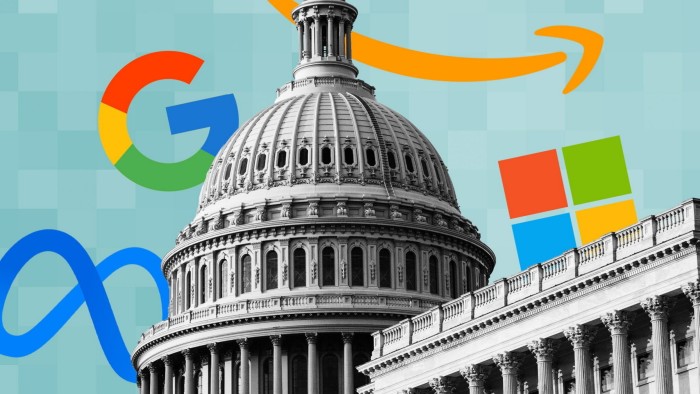Unlock the White House Watch newsletter for free
Your guide to what Trump’s second term means for Washington, business and the world
Big Tech companies are backing a lobbying campaign to pass a 10-year ban on US states regulating artificial intelligence models, in a controversial move that has split the AI industry and Donald Trump’s Republican party.
Lobbyists acting on behalf of Amazon, Google, Microsoft and Meta are urging the Senate to enact a decade-long moratorium on individual states introducing their own efforts to legislate AI, according to people familiar with the moves.
The provision was passed as part of the US House of Representatives’ version of President Donald Trump’s “one big, beautiful” budget bill last month. The Senate hopes to unveil its version as soon as this week in the hope of passing the legislation by July 4.
Chip Pickering, a former congressman and the chief executive of INCOMPAS, has advocated for the proposal on behalf of his tech trade association’s members, which include leading companies like Microsoft, Amazon, Meta and Google, as well as smaller data, energy and infrastructure companies and law firms.
“This is the right policy at the right time for American leadership,” Pickering told the Financial Times. “But it’s equally important in the race against China.”
Trade group INCOMPAS started the AI Competition Center (AICC) in 2024 to lobby legislators and regulators. At the start of the year, Amazon’s cloud division and Meta joined the AICC subgroup as debates over AI rules heated up and the EU introduced a series of measures to control the sector.
Google parent Alphabet and Meta declined to comment. Microsoft and Amazon did not respond to requests for comment.
Critics say Big Tech’s stance is about ensuring their dominance in the race to build artificial general intelligence, generally understood as models that surpass human abilities in most areas.
“Responsible innovation shouldn’t fear laws that ban irresponsible practices,” said Asad Ramzanali, director of AI and tech policy at the Vanderbilt Policy Accelerator at Vanderbilt University.
“[It’s] a power grab by tech bro-ligarchs attempting to concentrate yet more wealth and power,” said Max Tegmark, an MIT professor and president of the Future of Life Institute, a non-profit that campaigns for AI regulation.
The proposed moratorium has also divided the tech sector and Republican politicians, who have raised concerns about banning states from overseeing the powerful technology that has the potential to cause social and economic upheaval.

Proponents argue the provision is necessary to prevent a raft of inconsistent regional rules that could stifle innovation and cause the US to lose ground to China.
OpenAI chief executive Sam Altman said in a Senate hearing last month that it would be “disastrous” for the US to insist on technology companies meeting certain criteria, such as on transparency and safety, before launch, as could soon be the case in the European Union under its new AI Act.
AI safety campaigners like Anthropic co-founder Dario Amodei, have warned that relying on self-regulation could have disastrous societal consequences as Silicon Valley competes to release ever more powerful models.
Republicans pushing for including the proposal are now trying to figure out whether it complies with the Senate’s arcane rules, which mandate that every provision must have a budgetary impact for it to be included in a so-called “budget reconciliation” bill. The party is using the tactic so they can pass the bill without Democratic votes.
Ted Cruz, the top Republican on the Senate commerce committee, has proposed a workaround: states that don’t comply with the provision would be ineligible for billions in federal funding to expand broadband networks to underserved rural areas.
However, there remains little political consensus on how to oversee the fast-moving field and no meaningful federal regulations on testing or data protection have been passed so far.
“You don’t want the number one country in the world for innovation to fall behind on AI,” Republican senator Thom Tillis said in an interview. “If all of a sudden you’ve got 50 different regulatory or legal frameworks, how can anybody in their right mind not understand that that’s going to be an impediment?”
“I don’t like doing something that starts restricting states’ abilities,” said Republican senator Steve Daines. “But there may be some wisdom here, given that it could lead to a patchwork nature of regulation with AI that could hinder and slow down the United States.”
Other Republican senators like Josh Hawley, author of a book called The Tyranny of Big Tech, and Marsha Blackburn, who supports a Tennessee law defending her state’s music industry from unauthorised AI use, oppose the moratorium.
“We have no idea what AI will be capable of in the next 10 years and giving it free rein and tying states hands is potentially dangerous,” House Republican Marjorie Taylor Greene posted on X. “This needs to be stripped out in the Senate.”




